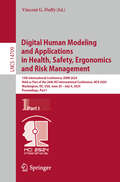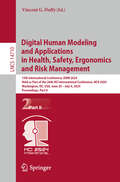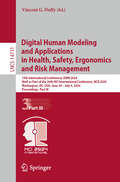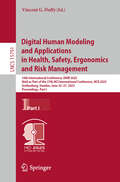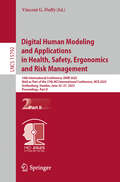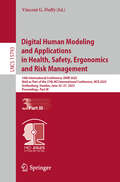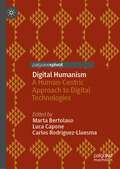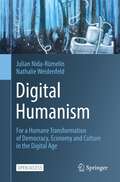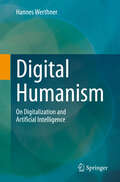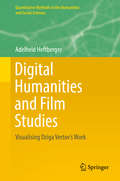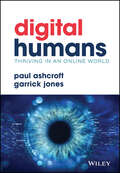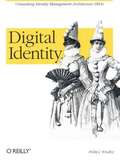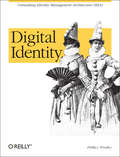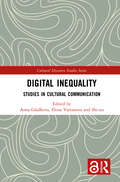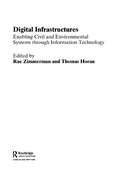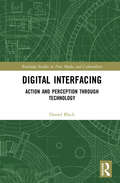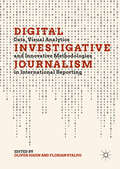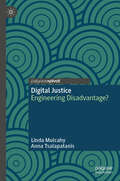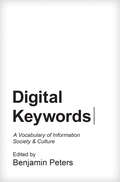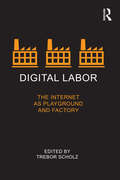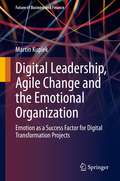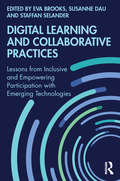- Table View
- List View
Digital Healthcare and Expertise: Mental Health and New Knowledge Practices (Health, Technology and Society)
by Claudia EgherThis open access book explores how expertise about bipolar disorder is performed on American and French digital platforms by combining insights from STS, medical sociology and media studies. It addresses topical questions, including: How do different stakeholders engage with online technologies to perform expertise about bipolar disorder? How does the use of the internet for processes of knowledge evaluation and production allow for people diagnosed with bipolar disorder to reposition themselves in relation to medical professionals? How do cultural markers shape the online performance of expertise about bipolar disorder? And what individualizing or collectivity-generating effects does the internet have in relation to the performance of expertise? The book constitutes a critical and nuanced intervention into dominant discourses which approach the internet either as a quick technological fix or as a postmodern version of Pandora’s box, sowing distrust among people and threatening unified conceptualizations and organized forms of knowledge.
Digital Human Modeling and Applications in Health, Safety, Ergonomics and Risk Management: 15th International Conference, DHM 2024, Held as Part of the 26th HCI International Conference, HCII 2024, Washington, DC, USA, June 29–July 4, 2024, Proceedings, Part I (Lecture Notes in Computer Science #14709)
by Vincent G. DuffyThis three-volume set LNCS 14709-14711 constitutes the refereed proceedings of the 15th International Conference on Digital Human Modeling and Applications in Health, Safety, Ergonomics and Risk Management, DHM 2024, held as part of the 26th International Conference, HCI International 2024, in Washington, DC, USA, during June 29 – July 4, 2024. The total of 1271 papers and 309 posters included in the HCII 2024 proceedings was carefully reviewed and selected from 5108 submissions. DHM 2024 method focuses on: Part I: Digital Human Modeling for Design and Evaluation; User Experience and Assistive Technologies; User Experience, Communication, and Collaboration. Part II: Healthcare Design and Support; Technology in Mental Health and Wellbeing; Artificial Intelligence and Health Applications. Part III: Work, Safety, and Ergonomics; Ergonomics, Artificial Intelligence and Smart Technologies, Advanced Technologies for Training and Learning.
Digital Human Modeling and Applications in Health, Safety, Ergonomics and Risk Management: 15th International Conference, DHM 2024, Held as Part of the 26th HCI International Conference, HCII 2024, Washington, DC, USA, June 29–July 4, 2024, Proceedings, Part II (Lecture Notes in Computer Science #14710)
by Vincent G. DuffyThis three-volume set LNCS 14709-14711 constitutes the refereed proceedings of the 15th International Conference on Digital Human Modeling and Applications in Health, Safety, Ergonomics and Risk Management, DHM 2024, held as part of the 26th International Conference, HCI International 2024, in Washington, DC, USA, during June 29 – July 4, 2024. The total of 1271 papers and 309 posters included in the HCII 2024 proceedings was carefully reviewed and selected from 5108 submissions. DHM 2024 method focuses on: Part I: Digital Human Modeling for Design and Evaluation; User Experience and Assistive Technologies; User Experience, Communication, and Collaboration. Part II: Healthcare Design and Support; Technology in Mental Health and Wellbeing; Artificial Intelligence and Health Applications. Part III: Work, Safety, and Ergonomics; Ergonomics, Artificial Intelligence and Smart Technologies, Advanced Technologies for Training and Learning.
Digital Human Modeling and Applications in Health, Safety, Ergonomics and Risk Management: 15th International Conference, DHM 2024, Held as Part of the 26th HCI International Conference, HCII 2024, Washington, DC, USA, June 29–July 4, 2024, Proceedings, Part III (Lecture Notes in Computer Science #14711)
by Vincent G. DuffyThis three-volume set LNCS 14709-14711 constitutes the refereed proceedings of the 15th International Conference on Digital Human Modeling and Applications in Health, Safety, Ergonomics and Risk Management, DHM 2024, held as part of the 26th International Conference, HCI International 2024, in Washington, DC, USA, during June 29 – July 4, 2024. The total of 1271 papers and 309 posters included in the HCII 2024 proceedings was carefully reviewed and selected from 5108 submissions. DHM 2024 method focuses on: Part I: Digital Human Modeling for Design and Evaluation; User Experience and Assistive Technologies; User Experience, Communication, and Collaboration. Part II: Healthcare Design and Support; Technology in Mental Health and Wellbeing; Artificial Intelligence and Health Applications. Part III: Work, Safety, and Ergonomics; Ergonomics, Artificial Intelligence and Smart Technologies, Advanced Technologies for Training and Learning.
Digital Human Modeling and Applications in Health, Safety, Ergonomics and Risk Management: 16th International Conference, DHM 2025, Held as Part of the 27th HCI International Conference, HCII 2025, Gothenburg, Sweden, June 22–27, 2025, Proceedings, Part I (Lecture Notes in Computer Science #15791)
by Vincent G. DuffyThis three-volume set LNCS 15791-15793 constitutes the refereed proceedings of the 16th International Conference on Digital Human Modeling and Applications in Health, Safety, Ergonomics and Risk Management, DHM 2025, held as part of the 27th International Conference on Human-Computer Interaction, HCII 2025, in Gothenburg, Sweden, during June 22-27, 2025.The total of 1430 papers and 355 posters included in the HCII 2025 proceedings was carefully reviewed and selected from 7972 submissions.The three volumes cover the following topics:Part I: Digital human modeling for healthcare and wellbeing; AI and digital human modeling in safety and risk management; and biomechanics, ergonomics, and risk mitigation.Part II: User experience design for sustainable products and public spaces; and wearable and digital health monitoring.Part III: Healthcare and rehabilitation innovation; augmented and virtual reality for health, wellbeing, and digital human modeling; and behavioral modeling and human-technology interaction.
Digital Human Modeling and Applications in Health, Safety, Ergonomics and Risk Management: 16th International Conference, DHM 2025, Held as Part of the 27th HCI International Conference, HCII 2025, Gothenburg, Sweden, June 22–27, 2025, Proceedings, Part II (Lecture Notes in Computer Science #15792)
by Vincent G. DuffyThis three-volume set LNCS 15791-15793 constitutes the refereed proceedings of the 16th International Conference on Digital Human Modeling and Applications in Health, Safety, Ergonomics and Risk Management, DHM 2025, held as part of the 27th International Conference on Human-Computer Interaction, HCII 2025, in Gothenburg, Sweden, during June 22-27, 2025.The total of 1430 papers and 355 posters included in the HCII 2025 proceedings was carefully reviewed and selected from 7972 submissions.The three volumes cover the following topics:Part I: Digital human modeling for healthcare and wellbeing; AI and digital human modeling in safety and risk management; and biomechanics, ergonomics, and risk mitigation.Part II: User experience design for sustainable products and public spaces; and wearable and digital health monitoring.Part III: Healthcare and rehabilitation innovation; augmented and virtual reality for health, wellbeing, and digital human modeling; and behavioral modeling and human-technology interaction.
Digital Human Modeling and Applications in Health, Safety, Ergonomics and Risk Management: 16th International Conference, DHM 2025, Held as Part of the 27th HCI International Conference, HCII 2025, Gothenburg, Sweden, June 22–27, 2025, Proceedings, Part III (Lecture Notes in Computer Science #15793)
by Vincent G. DuffyHealthcare and Rehabilitation Innovation: Personalized Decision Support by Artificial Intelligence for Cardiovascular Diseases: Responsible Innovation.- Multi-agent Assessment Generation System for SBIRT Training in Nursing.- Simulations for Optimizing Patient Transfer between Hospital and Nursing Home.- A Novel Skill Modeling Approach: Integrating Vergnaud&’s Scheme with Cognitive Architectures.- Development and Validation of Female Breastfeeding Aids.- Optimizing the Design and Usability of Digital Weight Loss Patient Decision Aids: Insights from Expert Interviews.- Collaborating with AI Agent: Smart Product-Service System Design for Adolescent Idiopathic Scoliosis Exercise Rehabilitation.- Research on UX of Rehabilitation Training Products for Adolescent Scoliosis.- User Experience in Exergames for Hand Rehabilitation: Explore the Content and Timing of Feedback Mechanisms. Augmented and Virtual Reality for Health, Well-being, and Digital Human Modeling: Application of AR Technology in Children&’s Nature Deficit Disorder Based on Contextual Cognition Theory.- Avatar Appearance Beyond Pixels - User Ratings and Avatar Preferences within Health Applications.- Identifying Usability Challenges in Text-to-Image AI: A Comprehensive Comparison among Mainstream Platforms.- Exploring the Impact of Virtual Avatars in V-Clinic on Male Health Information Disclosure and Information Acquisition.- First Impression Assessment of Digital Human Applicant Images Generated with Posture Prompts and Text Prompts.- MetaHumans: FEER and Social-Emotional Mimicry exercises.- Exploring the Effects of eHMI Position under Different Display Timings on Pedestrian Trust and Crossing Behavior in VR.- Using 3D and 4D Body Scanning to Model Thermal Comfort - Modelling Aspects.- Advancing Fit and Inclusivity: Utilizing BMI and Body Shape to Create 3D Avatars for Men&’s Extended-Size Suits. Behavioral Modeling and Human-Technology Interaction: Influence of Live E-Commerce Content on Users' Purchasing Behavior Based on SOR Theory.- Research on Enhancing Customer Satisfaction in Community Group Buying at M University Based on KANO-IPA.- Designing for Healthy Food Practices: Challenges and Opportunities for Changing People&’s Eating Behavior using Persuasive Technology.- Characterization of Human Behavior during User-Product-Interaction – a Pilot Study.- Exploring the Concept of Goal-Oriented Human-Machine Interface Design in an Agricultural Use Case.- Factors Influencing People&’s Emotional Experiences When Using ChatGPT for Health Information: A Cross-sectional Web-based Questionnaire Survey in the UK.- Design Method of Aging Service Robot Based on AIGC Incorporating TRIZ Theory.- Research on Design Strategies for Co-working Space Furniture from the Perspective of Adaptive Design.
Digital Humanism: A Human-Centric Approach to Digital Technologies
by Marta Bertolaso Luca Capone Carlos Rodríguez-LluesmaThis book provides an accessible and up to date overview of the foundational issues about both emerging constructive understandings of the digital era and still hidden and ignored aspects that could instead be dramatically relevant in the future, in the process of a technological humanism. The book offers relevant scientific and ethical questions bringing together professionals and researchers, from different professional and disciplinary fields, who have a shared interest in investigating operative aspects of technological, digital and cultural transitions of humans and their capacity of building human societies. The challenges are clear but there is a lack of an epistemological, anthropological, economic and social agenda that would enable a drive to such transitions towards a technological humanism. This book provides an ideal platform for professionals and scholars, not only providing tools for problem analysis, but also indicating shared directions, needs and objectives for a common goal; the creation of new scenarios instead of the creation of fears and manipulated social imaginaria.
Digital Humanism: For a Humane Transformation of Democracy, Economy and Culture in the Digital Age
by Julian Nida-Rümelin Nathalie WeidenfeldThis open access book deals with cultural and philosophical aspects of artificial intelligence (AI) and pleads for a “digital humanism”. This term is beginning to be en vogue everywhere. Due to a growing discontentment with the way digitalization is being used in the world, particularly formulated by former heroes of Internet, social media and search engine companies, philosophical as well as industrial thought leaders begin to plead for a humane use of digital tools. Yet the term “digital humanism” is a particular terminology that lacks a sound conceptual and philosophical basis and needs clarification still – and this gap is exactly filled by this book. It propagates a vision of society in which digitization is used to strengthen human self-determination, autonomy and dignity and whose time has come to be propagated throughout the world. The advantage of this book is that it is philosophically sound and yet written in a way that will make it accessible for everybody interested in the subject. Every chapters begins with a film scene illustrating a precise philosophical problem with AI and how we look at it – making the book not only readable, but even entertaining. And after having read the book the reader will have a clear vision of what it means to live in a world where digitization and AI are central technologies for a better and more humane civilization.
Digital Humanism: On Digitalization and Artificial Intelligence
by Hannes WerthnerInformation technology (IT) is changing us, our society and our world, and it influences how we perceive the world and how we think about it. This book describes the rather complex development of IT over the last 70 years, highlights the dynamics of this process, and critically reflects on both ongoing technical and related societal changes. The book discusses fundamental developments in informatics, looks at recent &“game changers&” like artificial intelligence and the Web with their dynamics and their repercussions on our lives and on society, which are at the same time – like so many new technologies in the history of mankind – both positive and negative. It explains and analyzes the complex interplay of technology and humans, and it also tries to point us towards a sustainable society and a better life respecting human rights. To this end, it introduces Digital Humanism, a holistic and proactive approach that focuses on the analysis of this process and the integration of technical and social innovation. This is a science communication book, written for a broad readership and assumes no specific prior knowledge, just an interest in the subject. It provides a framework for how to use IT reasonably, consciously, sensibly, and sustainably – in accordance with human rights and the UN&’s Sustainable Development Goals.
Digital Humanities and Film Studies: Visualising Dziga Vertov's Work (Quantitative Methods in the Humanities and Social Sciences)
by Adelheid HeftbergerThis book highlights the quantitative methods of data mining and information visualization and explores their use in relation to the films and writings of the Russian director, Dziga Vertov. The theoretical basis of the work harkens back to the time when a group of Russian artists and scholars, known as the “formalists,” developed new concepts of how art could be studied and measured. This book brings those ideas to the digital age. One of the central questions the book intends to address is, “How can hypothetical notions in film studies be supported or falsified using empirical data and statistical tools?” The first stage involves manual and computer-assisted annotation of the films, leading to the production of empirical data which is then used for statistical analysis but more importantly for the development of visualizations. Studies of this type furthermore shed light on the field of visual presentation of time-based processes; an area which has its origin in the Russian formalist sphere of the 1920s and which has recently gained new relevance due to technological advances and new possibilities for computer-assisted analysis of large and complex data sets. In order to reach a profound understanding of Vertov and his films, the manual or computer-assisted data analysis must be combined with film-historical knowledge and a study of primary sources. In addition, the status of the surviving film materials and the precise analysis of these materials combined with knowledge of historical film technology provide insight into archival policy and political culture in the Soviet Union in the 1920s and 30s.
Digital Humans: Thriving in an Online World
by Garrick Jones Paul AshcroftEmbrace the Human Side of Organisational Digital Transformation Digital Humans: Thriving in an Online World is an insightful, engaging and interdisciplinary discussion of how best to transform your organisation into a nimble, digital enterprise with human beings firmly established at the centre of it. The authors draw on complexity theory, anthropology, history, organisational transformation and behavioural science to demonstrate the characteristics that define successful digital organisations. You’ll discover the importance of focusing on human beings even as you make the shift to digital and learn to understand the importance of our new digital ecosystems. Illuminating case studies and examples of organisations that have successfully made the jump to digital are explored and the book presents new and effective ways to make strategic decisions about your company’s future based on our new physical-digital hybrid reality. A can’t-miss blueprint to a market environment and world that’s increasingly fast-moving, complex and rewarding, Digital Humans will find a place in the libraries of managers, executives, and business leaders looking for an engaging roadmap to digital transformation that wouldn’t have us leave our humanity behind.
Digital Identity
by Phil WindleyThe rise of network-based, automated services in the past decade has definitely changed the way businesses operate, but not always for the better. Offering services, conducting transactions and moving data on the Web opens new opportunities, but many CTOs and CIOs are more concerned with the risks. Like the rulers of medieval cities, they've adopted a siege mentality, building walls to keep the bad guys out. It makes for a secure perimeter, but hampers the flow of commerce. Fortunately, some corporations are beginning to rethink how they provide security, so that interactions with customers, employees, partners, and suppliers will be richer and more flexible. Digital Identity explains how to go about it. This book details an important concept known as "identity management architecture" (IMA): a method to provide ample protection while giving good guys access to vital information and systems. In today's service-oriented economy, digital identity is everything. IMA is a coherent, enterprise-wide set of standards, policies, certifications and management activities that enable companies like yours to manage digital identity effectively--not just as a security check, but as a way to extend services and pinpoint the needs of customers. Author Phil Windley likens IMA to good city planning. Cities define uses and design standards to ensure that buildings and city services are consistent and workable. Within that context, individual buildings--or system architectures--function as part of the overall plan. With Windley's experience as VP of product development for Excite@Home.com and CIO of Governor Michael Leavitt's administration in Utah, he provides a rich, real-world view of the concepts, issues, and technologies behind identity management architecture. How does digital identity increase business opportunity? Windley's favorite example is the ATM machine. With ATMs, banks can now offer around-the-clock service, serve more customers simultaneously, and do it in a variety of new locations. This fascinating book shows CIOs, other IT professionals, product managers, and programmers how security planning can support business goals and opportunities, rather than holding them at bay.
Digital Identity
by Phil WindleyThe rise of network-based, automated services in the past decade has definitely changed the way businesses operate, but not always for the better. Offering services, conducting transactions and moving data on the Web opens new opportunities, but many CTOs and CIOs are more concerned with the risks. Like the rulers of medieval cities, they've adopted a siege mentality, building walls to keep the bad guys out. It makes for a secure perimeter, but hampers the flow of commerce. Fortunately, some corporations are beginning to rethink how they provide security, so that interactions with customers, employees, partners, and suppliers will be richer and more flexible. Digital Identity explains how to go about it. This book details an important concept known as "identity management architecture" (IMA): a method to provide ample protection while giving good guys access to vital information and systems. In today's service-oriented economy, digital identity is everything. IMA is a coherent, enterprise-wide set of standards, policies, certifications and management activities that enable companies like yours to manage digital identity effectively--not just as a security check, but as a way to extend services and pinpoint the needs of customers. Author Phil Windley likens IMA to good city planning. Cities define uses and design standards to ensure that buildings and city services are consistent and workable. Within that context, individual buildings--or system architectures--function as part of the overall plan. With Windley's experience as VP of product development for Excite@Home.com and CIO of Governor Michael Leavitt's administration in Utah, he provides a rich, real-world view of the concepts, issues, and technologies behind identity management architecture. How does digital identity increase business opportunity? Windley's favorite example is the ATM machine. With ATMs, banks can now offer around-the-clock service, serve more customers simultaneously, and do it in a variety of new locations. This fascinating book shows CIOs, other IT professionals, product managers, and programmers how security planning can support business goals and opportunities, rather than holding them at bay.
Digital Identity and Everyday Activism: Sharing Private Stories With Networked Publics (Palgrave Studies in Communication for Social Change)
by Sonja VivienneThis book reinvigorates the space between scholarly texts on self-representation, voice and agency and practical field-guides to community media and digital storytelling. It offers reflection on the ethical praxis of co-creative media, and an indispensable suite of digitally savvy representation strategies, pertinent to modern people everywhere.
Digital Identity: Unmasking Identity Management Architecture (IMA)
by Phillip J. WindleyThe rise of network-based, automated services in the past decade has definitely changed the way businesses operate, but not always for the better. Offering services, conducting transactions and moving data on the Web opens new opportunities, but many CTOs and CIOs are more concerned with the risks. Like the rulers of medieval cities, they've adopted a siege mentality, building walls to keep the bad guys out. It makes for a secure perimeter, but hampers the flow of commerce.Fortunately, some corporations are beginning to rethink how they provide security, so that interactions with customers, employees, partners, and suppliers will be richer and more flexible. Digital Identity explains how to go about it. This book details an important concept known as "identity management architecture" (IMA): a method to provide ample protection while giving good guys access to vital information and systems. In today's service-oriented economy, digital identity is everything. IMA is a coherent, enterprise-wide set of standards, policies, certifications and management activities that enable companies like yours to manage digital identity effectively--not just as a security check, but as a way to extend services and pinpoint the needs of customers.Author Phil Windley likens IMA to good city planning. Cities define uses and design standards to ensure that buildings and city services are consistent and workable. Within that context, individual buildings--or system architectures--function as part of the overall plan. With Windley's experience as VP of product development for Excite@Home.com and CIO of Governor Michael Leavitt's administration in Utah, he provides a rich, real-world view of the concepts, issues, and technologies behind identity management architecture.How does digital identity increase business opportunity? Windley's favorite example is the ATM machine. With ATMs, banks can now offer around-the-clock service, serve more customers simultaneously, and do it in a variety of new locations. This fascinating book shows CIOs, other IT professionals, product managers, and programmers how security planning can support business goals and opportunities, rather than holding them at bay.
Digital Inequality: Studies in Cultural Communication (Cultural Discourse Studies Series)
by Shi-Xu Anna Gladkova Elena VartanovaTracing the development of new technological skills and digital cultures, this book looks at the rise of new digital divides and reveals how these inequalities affect cross-cultural communication from a cultural discourse studies perspective in various ethnic and cultural groups across the world.The authors discuss the development of multicultural societies across the globe under new challenges brought by digitalization, such as digital exclusion, new professional and personal demands in terms of digital engagement. In addition to highlighting digital inequalities in access, use and benefits of using ICTs, case studies from different national contexts demonstrate the ways minority ethnic and cultural groups are adapting to the new digital environment; explore the transformations that multicultural affairs and communication undergo in the new digital setting; and analyse policy measures aimed at fostering digital inclusion of minor groups. The book advances knowledge of the digital divide, showing its development from a technological access- and skill-based problem into a social and culture-oriented one.This resourceful text will be of interest to students and scholars of social inequality, digital media and communication studies and anyone interested in learning how multicultural discourses are developing in varied national contexts today.
Digital Infrastructures: Enabling Civil and Environmental Systems through Information Technology (Networked Cities Series)
by Thomas Horan Rae ZimmermanAn invisible network of digital technology systems underlies the highly visible networks of roads, waterways, satellites, and power-lines. Increasingly, these systems are becoming the "infrastructure's infrastructure," providing a crucial array of data on network demand, performance, reliability, and security. Digital Infrastructures presents an interdisciplinary analysis of the technological systems that envelop these networks. The book balances analyses of specific civil and environmental infrastructures with broader policy and management issues, including the challenges of using IT to manage these critical systems under crises conditions.
Digital Interfacing: Action and Perception through Technology (Routledge Studies in New Media and Cyberculture)
by Daniel BlackThis book takes the interface – or rather to interface, a process rather than a discrete object or location – as a concept emblematic of our contemporary embodied relationship with technological artefacts. The fundamental question addressed by this book is: How can we understand what it means to perceive or act upon the world as a body–artefact assemblage? Black works to clarify the role of artefacts of all kinds in human perception and action, then considers the ways in which new digital technologies can expand and transform this capacity to change our mode of engagement with our environment. Throughout, the discussion is grounded in specific technologies – some already familiar and some still in development (e.g. new virtual reality and brain–machine interface technologies, natural user interfaces, etc.). In order to develop a detailed, generalizable theory of how we interface with technology, Black assembles an analytical toolkit from a number of different disciplines, including media theory, ethology, clinical psychology, cultural theory, philosophy, science and technology studies, cultural history, aesthetics and neuroscience.
Digital Investigative Journalism: Data, Visual Analytics and Innovative Methodologies in International Reporting
by Oliver Hahn Florian StalphIn the post-digital era, investigative journalism around the world faces a revolutionary shift in the way information is gathered and interpreted. Reporters in the field are confronted with data sources, new logics of information dissemination, and a flood of disinformation. Investigative journalists are working with programmers, designers and scientists to develop innovative tools and hands-on approaches that assist them in disclosing the misuse of power and uncovering injustice. This volume provides an overview of the most sophisticated techniques of digital investigative journalism: data and computational journalism, which investigates stories hidden in numbers; immersive journalism, which digs into virtual reality; drone journalism, which conquers hitherto inaccessible territories; visual and interactive journalism, which reforms storytelling with images and audience perspectives; and digital forensics and visual analytics, which help to authenticate digital content and identify sources in order to detect manipulation. All these techniques are discussed against the backdrop of international political scenarios and globally networked societies. This edited volume, written by renowned international media practitioners and scholars, is full of illuminating insights into digital investigative journalism and addresses professional journalists, journalism researchers and students.
Digital Justice: Engineering Disadvantage? (Palgrave Socio-Legal Studies)
by Linda Mulcahy Anna TsalapatanisThis book explores an increasingly important issue for legal systems across the world. It asks what do we lose and gain when legal proceedings go online? Adopting a multi-disciplinary socio-legal perspective, it draws on an emerging body of empirical evidence from the UK, Australia, Canada and the US about the ways in which digital justice is being conceived of and experienced. Insights are drawn from across the social sciences to discuss the interface of digitalisation with a range of issues such as due process, procedural justice, digital disadvantage, ceremony and ritual, science and technology studies and the dematerialisation of the civic sphere. Written accessibly and provocatively, it poses questions from a variety of different perspective with a particular focus on marginalised groups.
Digital Keywords: A Vocabulary of Information Society and Culture
by Benjamin PetersIn the age of search, keywords increasingly organize research, teaching, and even thought itself. Inspired by Raymond Williams's 1976 classic Keywords, the timely collection Digital Keywords gathers pointed, provocative short essays on more than two dozen keywords by leading and rising digital media scholars from the areas of anthropology, digital humanities, history, political science, philosophy, religious studies, rhetoric, science and technology studies, and sociology. Digital Keywords examines and critiques the rich lexicon animating the emerging field of digital studies. This collection broadens our understanding of how we talk about the modern world, particularly of the vocabulary at work in information technologies. Contributors scrutinize each keyword independently: for example, the recent pairing of digital and analog is separated, while classic terms such as community, culture, event, memory, and democracy are treated in light of their historical and intellectual importance. Metaphors of the cloud in cloud computing and the mirror in data mirroring combine with recent and radical uses of terms such as information, sharing, gaming, algorithm, and internet to reveal previously hidden insights into contemporary life. Bookended by a critical introduction and a list of over two hundred other digital keywords, these essays provide concise, compelling arguments about our current mediated condition. Digital Keywords delves into what language does in today's information revolution and why it matters.
Digital Labor: The Internet as Playground and Factory
by Trebor ScholzDigital Labor calls on the reader to examine the shifting sites of labor markets to the Internet through the lens of their political, technological, and historical making. Internet users currently create most of the content that makes up the web: they search, link, tweet, and post updates—leaving their "deep" data exposed. Meanwhile, governments listen in, and big corporations track, analyze, and predict users’ interests and habits. This unique collection of essays provides a wide-ranging account of the dark side of the Internet. It claims that the divide between leisure time and work has vanished so that every aspect of life drives the digital economy. The book reveals the anatomy of playbor (play/labor), the lure of exploitation and the potential for empowerment. Ultimately, the 14 thought-provoking chapters in this volume ask how users can politicize their troubled complicity, create public alternatives to the centralized social web, and thrive online. Contributors: Mark Andrejevic, Ayhan Aytes, Michel Bauwens, Jonathan Beller, Patricia Ticineto Clough, Sean Cubitt, Jodi Dean, Abigail De Kosnik, Julian Dibbell, Christian Fuchs, Lisa Nakamura, Andrew Ross, Ned Rossiter, Trebor Scholz, Tizania Terranova, McKenzie Wark, and Soenke Zehle
Digital Leadership, Agile Change and the Emotional Organization: Emotion as a Success Factor for Digital Transformation Projects (Future of Business and Finance)
by Martin KupiekThis book shows an innovative way for managers to gain a better understanding of emotions in teams and organizational units and thus positively influence agile development in the context of digital transformation of companies. Digitalization does not just lead to technical changes. It dramatically changes the way employees work with each other as well as how executives play their roles. In an agile working environment, middle management in particular loses power, influence, and relevance, and customer relationships are subject to greater affectivity. The result is an increased emotionalization of the actors, which should be recognized and understood prior to designing the emotional landscape of the organization and to developing and implementing successful business models. The author introduces various conventional and AI-based instruments based on current research for handling emotions, supported by practical concepts.
Digital Learning and Collaborative Practices: Lessons from Inclusive and Empowering Participation with Emerging Technologies
by Eva Brooks Staffan Selander Susanne DauDigital Learning and Collaborative Practices offers a comprehensive overview of design-based, technology-enhanced approaches to teaching and learning in virtual settings. Today’s digital communications foster new opportunities for sharing culture and knowledge while also prompting concerns over division, disinformation and surveillance. This book uniquely emphasises playful, collaborative experiences and democratic values in a variety of environments—adaptive, augmented, dialogic, game-based and beyond. Graduate students and researchers of educational technology, the learning sciences and interaction design will discover rich theories, interventions, models and approaches for concretising emerging practices and competencies in digital learning spaces.

